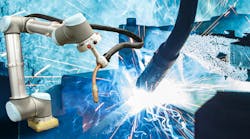President Donald Trump’s latest executive order has blocked the biggest tech deal ever, halting Singapore-based Broadcom Limited from completing its $117 billion hostile takeover of Qualcomm, America’s largest mobile chip manufacturer, invoking the Defense Production Act of 1950:
“There is credible evidence that leads me to believe that Broadcom Limited… through exercising control of Qualcomm Incorporated (Qualcomm), a Delaware corporation, might take action that threatens to impair the national security of the United States…”
In a succinct public retort, Broadcom responded: “Broadcom is reviewing the Order. Broadcom strongly disagrees that its proposed acquisition of Qualcomm raises any national security concerns.”
Trump also ordered Qualcomm to reconvene its 2018 Annual Meeting of Stockholders on March 23 and barred any Broadcom director nominee to hold that title for Qualcomm.
The president did not expound upon that “credible evidence,” though the Committee on Foreign Investment in the U.S (CFIUS) has investigated the merger. On March 5, CFIUS sent a letter to both Broadcom and Qualcomm that questioned the deal due to Qualcomm’s “dominant role” in the telecommunication infrastructure and Broadcom’s reputation for cutting costs, not spending on new technological innovations.
Also on March 5, Qualcomm released a statement:
Broadcom Limited’s response to the order from the Committee on Foreign Investment in the U.S. (CFIUS) is a continuation of its now familiar pattern of deliberately seeking to mislead shareholders and the general public by using rhetoric rather than substance to trivialize and ignore serious regulatory and national security issues.
Qualcomm’s powerful chips, which get smaller and more powerful every year, are integral to the function and performance of a litany of emerging technologies, from drones to smartphones to self-driving cars. Through its focus on developing disruptive innovations, Qualcomm, which employs 13,000 workers in the San Diego area, is also leading the way in 5G. The company says its Snapdragon X50 5G Modem can support download speeds of up to 5 GB/sec. That’s fast enough to download the entire Lord of the Rings trilogy (extended editions in HD) in about the time it took to read this sentence.
With 5G capability coming to consumers and industry by year’s end, it’s understandable why America’s government would want to keep its technological superiority here. Losing the edge in the U.S., CFIUS argues, could clear a path for China’s Huawei Technologies to become the top chip supplier for the next wave of smart devices, including robots to IIoT devices.
The U.S. was at one time the dominant force in steel production, and by failing to stay innovation-focused, lost out to Asia. China now produces 49% of the world’s steel.
“As soon as prices began to rise so that the steel companies began to be profitable, they stopped modernizing,” lamented Ken Iverson, American steel producer Nucor’s CEO, way back in 1986.
Trump’s reactive efforts to rejuvenate that industry has led to a new 25% tariff on steel.
For the 21st century economy, high-tech processors will arguably be vastly more important. Microsoft and Google expressed concern last December about the deal for this very reason, citing Broadcom’s lack of R&D spending. It should be noted that their competitor in the mobile space, Apple, has a close relationship Broadcom, while at the same time suing Qualcomm for $1 billion over chip patents. Qualcomm is also counter-suing Apple.
This is by far the biggest, but not the first time Trump has intervened with protectionist measures to pry foreign hands off American tech companies.
Since Feb. 2017, Trump has directly or indirectly stopped nine other deals totaling $6 billion, Bloomberg reports.
And while government intervention in business seems all-together un-American and anti-capitalist, Trump’s moves are backed by credible economic theory.
In debating mergers between Dow and Dupont, as well as Monsanto and Bayer, the EU weighed innovation, or the lack thereof, heavily into their decisions.
Tommaso M. Valletti, European Commission’s Chief Competition Economist, argues that with horizontal mergers, the future of innovation should be of paramount concern. A paper on the subject he co-authored concludes:
The negative effect on innovation incentives tends to be stronger when the merging parties are close competitors. The non-merging firms increase their innovation effort following a merger, but this increase does not compensate for the reduction of innovation effort by the merging firms. This implies that total innovation falls after the merger.
A Harvard Business Review report on Big Pharma mergers also found:
…mergers significantly diminish the amount of research and development (R&D) and innovation at rival firms as well, dragging down expenditures in patenting and R&D by more than 20%.
Continued advancements, and price control, over drugs and pesticides keep our crops growing and stave off disease, so any hits to R&D can have major ramifications for the next miracle crop or cure. Applying the same fundamental theory, that lack of competition kills the innovate spirit, to technology, there’s no telling how harmful this deal would be to the future of America’s industries and infrastructure.
If as officials speculate would happen if the deal were approved, and the Broadcom/Qualcomm fell behind in R&D to reap higher profits, Huawei would become the leader in mobile processors. They could raise prices on exported chips, or worse, keep the best chips in China to be used as its government sees fit and give America inferior chips. As the Internet of Things and connectivity become ever more important to increasing productivity and implementing AI, this becomes a tech arms race where China could foreseeably lap the U.S. If China deems 6G, or whatever comes next, as vital to its national security and manufacturing dominance, why would they allow the U.S. to have it first?
If the recent steel tariffs can teach us anything, it’s that to stay on top, you must keep modernizing and improving. And even though it might be unfair to say Broadcom wouldn’t do a bang-up job and innovate even better in charge of Qualcomm, the risks outweigh the rewards.
Currently, Qualcomm is pushing the boundaries on what kind of sensors and capabilities you can fit on a chip, leading the way on a revolutionary new technology: 5G. Meanwhile, Broadcom is desperately trying to force itself on an unwilling partner.
America simply has too much at stake to lose to take that sort of risk.
What do you think? Tell us in the comments below.















